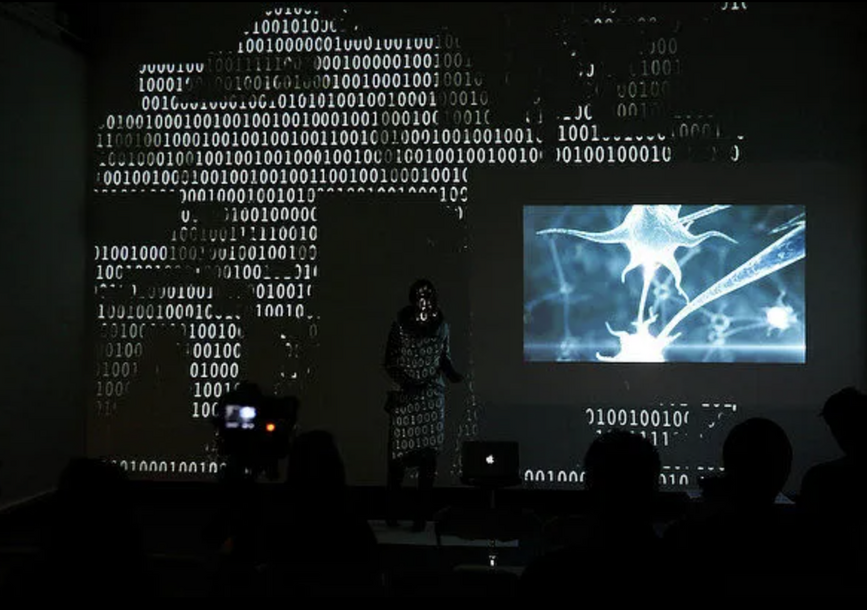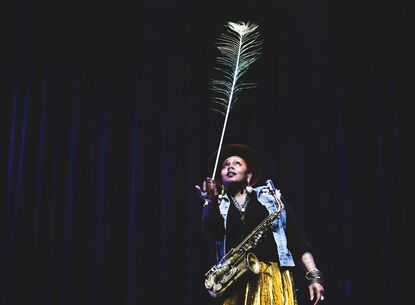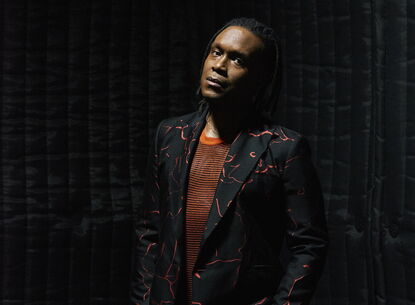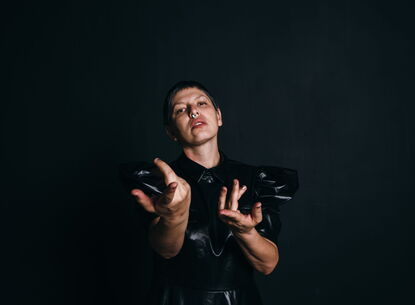
Conference
about the panelists
Scott Benzel
Scott Benzel is a multimedia artist living and working in Los Angeles. His work has been shown or performed at the J. Paul Getty Museum, Los Angeles; the Los Angeles County Museum of Art; the Museum of Contemporary Art, Los Angeles; LAXART, Los Angeles; The MAK Center for Art and Architecture, Los Angeles; The Palm Springs Art Museum; and the Contemporary Art Museum St. Louis. And it was featured in Made in LA 2012 at the Hammer Museum, Los Angeles. Benzel has curated shows at the Los Angeles Contemporary Archive; the MAK Center for Art and Architecture (Schindler House and Mackey House), Los Angeles; and the Welcome Inn, Eagle Rock, California, as part of Pacific Standard Time organized by the Getty Museum, among others. He is a member of the faculty of the School of Art at California Institute of the Arts (CalArts).
Dan Bustillo
Dan Bustillo (they/them/theirs) is a writer and scholar based in Los Angeles. Their research focuses on trans Latinx activist media. They are a PhD candidate at the University of California, Irvine. Bustillo is also superhero-superscrooger in training with The Revolution School.
Cryptoparty LA
Cryptoparty LA has been bringing the party back to cryptoparty in the Los Angeles since 2014. Events hosted by Prof X, Taze, and Noname.
Tom Leeser
Tom Leeser is a digital media artist, educator, curator, and writer. He is program director of the Art and Technology program and director of the Center for Integrated Media at the California Institute of the Arts. Tom received his BFA and MFA from the San Francisco Art Institute. His film, video, online work, interactive installations, and public performances have been exhibited at Eyebeam, the Academy of Motion Picture Arts and Sciences, Machine Project, the Mount Wilson Observatory, MASS MoCA, The Santa Monica Museum of Art, The Fowler Museum, REDCAT, The Kitchen, The Millennium, SIGGRAPH, and film and video festivals worldwide, with support from Art Matters, Creative Time, and the Daniel Langlois Foundation.
Lauren Lee McCarthy
Lauren Lee McCarthy is an artist examining social relationships in the midst of surveillance, automation, and algorithmic living. She is the creator of p5.js, an open-source creative coding platform that prioritizes inclusion and access, and a part of the Processing Foundation. She has received grants and residencies from Creative Capital, United States Artists, Sundance New Frontier, Eyebeam, Pioneer Works, Autodesk, and Ars Electronica. Her work SOMEONE was awarded the Ars Electronica Golden Nica and the Japan Media Arts Social Impact Award, and her work LAUREN was awarded the IDFA DocLab Award for Immersive Non-Fiction. McCarthy’s work has been exhibited internationally at the Barbican Centre, Ars Electronica, Fotomuseum Winterthur, Haus der Elektronischen Künste, SIGGRAPH, Onassis Cultural Center, IDFA, Science Gallery Dublin, and the Seoul Museum of Art. McCarthy is an associate professor at UCLA Design Media Arts.
Sarah T. Roberts
Sarah T. Roberts is an associate professor at UCLA (Gender Studies, Information Studies, Labor Studies), specializing in internet and social media policy and culture as well as the intersection of media, technology and society. She is the faculty director and co-founder of the UCLA C2i2, co-director of the Minderoo Initiative on Technology and Power, and a research associate of the Oxford Internet Institute.
Roberts researches information work and workers and is a leading global authority on “commercial content moderation.” She coined the term “commercial content moderation” to describe the work of those responsible for making sure media content posted to major commercial social platforms fit within legal, ethical, and the site’s own guidelines and standards. She is frequently consulted on matters of policy, worker welfare, and governance related to content moderation issues and the broader social media landscape. Roberts can be seen and heard in many news reports, interviews, podcasts, and programs. Additionally, she has experience in the industry as a consultant and researcher, working for Twitter in 2022.
She is a 2018 Carnegie fellow and winner of the 2018 Electronic Frontier Foundation Barlow Pioneer Award in recognition of her work on commercial content moderation.
Her book, Behind the Screen: Content Moderation in the Shadows of Social Media, was released in June 2019 and in paperback with a new preface in early 2022 (Yale University Press) and in a French edition, Derrière les écrans (Éditions La Découverte) in October 2020. A Mandarin edition will appear in early 2023.
Tim Schwartz
Tim Schwartz (born 1981) focuses on data privacy and digital information as an artist, activist, and technologist. Schwartz received a BA from Wesleyan University in Physics and an MA from UCSD in Visual Arts. He is the author of A Public Service: Whistleblowing, Disclosure and Anonymity published by OR Books. Schwartz co-organizes the digital training organization LA Cryptoparty. From 2004 to 2007, Schwartz was the assistant curator of Digital Media at the Museum of the Moving Image in NYC. He lives in Los Angeles.
Olivia Snow
Olivia Snow (she/her) is a writer, dominatrix, and research fellow at UCLA’s C2i2, where she studies sex work/ers, labor rights, tech, and policy. Her work arises from her doctoral research on the dehumanization of the laboring body under industrial capitalism, her organizing for policies to support community safety and harm reduction, and her lived experience of financial deplatforming and algorithmic surveillance as a sex worker. A professional dominatrix trained in the humanities, she also analyzes the symbiotic relationship between popular imaginings of sex work/ers and the legislation that criminalizes our labor. Always with the goal of decriminalization and liberation, Snow’s research currently centers around the surveillance of in-person sex workers by Big Tech and the violence of financial and social deplatforming. She holds a PhD in American Literature, and prior to joining C2i2, she was a research fellow at New York University’s AI Now Institute.
Ramesh Srinivasan
Ramesh Srinivasan speaks about the intersection of technology, innovation, politics, business, and society. He is a leading voice pointing the way toward a digital world that supports democracy, economic security, and business interests. He blends his skills as a leading academic, author, engineer, social scientist, storyteller, policy adviser, and thought leader to shine a light on how technology and innovation, from all quarters and countries, will make a balanced world possible for all. His mission is to help repair the disconnect between designers and users, producers and consumers, and tech elites and the rest of us toward a more democratic internet.
Srinivasan has been a faculty member at UCLA since 2005 in the Information Studies and Media Arts departments. He is the founder of the UC-wide Digital Cultures Lab, which offers a unique people-focused analysis of new technologies working across every continent and dozens of countries across the world. This lab examines the means by which new media technologies impact businesses, economics, cultures, politics, labor, and the environment through collaborations with global partners. He explores the future of algorithms, AI, automation, and cryptocurrencies with these themes in mind and holds degrees from Stanford (Bachelor of Science in Engineering), the MIT Media Laboratory (Master of Science), and Harvard (PhD). Srinivasan is the author of three books: Beyond the Valley: How Innovators around the World are Overcoming Inequality and Creating the Technologies of Tomorrow (MIT Press), Whose Global Village? Rethinking How Technology Impacts Our World (2019l, NYU Press) and After the Internet with Adam Fish.
Matias Viegener
Matias Viegener is a writer, artist, and critic who works solo and collaboratively in the fields of writing, visual art, and social practice. He is the author of experimental nonfiction book 2500 Random Things About Me Too, hailed as the first book composed on and through Facebook. In 2004, he co-founded Fallen Fruit, a participatory art practice focusing on fruit, urban space, and public life (he left the collaboration in 2013). His work has been exhibited at The Los Angeles County Museum of Art, Yerba Buena Center for the Arts, the Utah Museum of Contemporary Art, The Kitchen, Ars Electronica, The Whitney Museum, The Smart Museum of Art, The Blaffer Art Museum, Los Angeles Contemporary Exhibitions, Machine Project, New Langton Arts, Highways Performance Space, The Hammer Museum, the ARCO Madrid biennial, and the San Diego Museum of Contemporary Art, as well as internationally in Denmark, Germany, Austria, Colombia, and Mexico.



